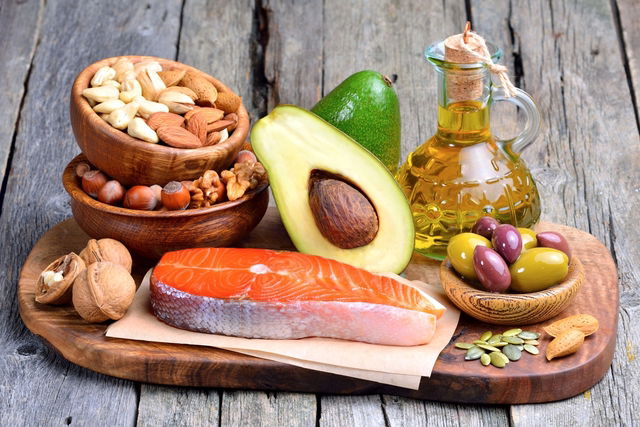Foods that are rich in omega-3, like flaxseeds, olive oil, walnuts, almonds and some fish, provide excellent health benefits. They help to prevent cardiovascular diseases, like high blood pressure, heart attack and cardiac failure.
Omega-3 foods can help to promote optimal brain health, as these foods then to improve memory, concentration and mood. They are often recommended to prevent mental health conditions like depression.
It is worth highlighting that these foods can be used to complement prescribed medical treatment for mood disorders, like depression, and chronic inflammatory diseases, like rheumatoid arthritis.

Foods rich in omega-3
The following table indicates the quantity of omega-3 naturally present in each 100 g of food:
The amounts you should add to your diet should be indicated by a health care professional, who can assess your nutritional needs and provide guidelines regarding omega-3 intake.
Food enriched with omega-3
Foods with butter, milk, eggs and bread can be enriched with omega-3. These can be a great way to increase your daily omega-3 intake.
The quality and quantity of omega-3 in these foods is very small, however. Therefore you should opt for foods that are naturally rich in this nutrient whenever possible. You should aim for at least 2 of these foods per week. Learn more about the health benefits that omega-3 can offer.
Daily recommended dose
The daily recommended dose of omega-3 varies according to age and gender, and is outlined below:
When to supplement
Omega-3 supplementation is normally done with capsules that contain fish oil, krill oil, cod liver oil, or vegetarian capsules that contain seawood oil. These supplements should be prescribed by a doctor or registered dietitian. Fish oil-based capsules usually contain 1000 mg of the oil, which has 180 mg of EPA and 120 mg of DHA.
Omega-3 supplements can be taken during pregnancy and breastfeeding, and is indicated if there is a deficiency in this nutrient or to decrease high triglyceride levels in the blood.
Omega-3 recipes
The following recipes are rich in omega-3 and can be consumed as part of a healthy, balanced diet:
1. Low-carb pancake with flaxseed and chia seeds
Ingredients:
- 1 egg
- 30 ml of water
- 10 ml of cream
- 10 g of flaxseed flour
- 1 teaspoon of chia seeds
- 140 g of washed and rinsed spinach
- 1 tablespoon of olive oil
- 1/4 onion, diced
- 1 pinch of oregano
- 3 pinches of salt
- 50 g of fresh ricotta
How to prepare:
In a bowl, add the egg, water and cream and mix. Add the flour, salt and chia seeds and knead until it becomes a smooth batter. Melt the butter and olive oil in a frying pan to cover the bottom. Add a ladleful of batter once the oil is hot, and allow to spread to a pancake shape. Wait for the batter to form and cook underneath, then flip. Continue to add ladlefuls of batter to the frying pan to make more pancakes.
For the topping, heat up a frying pan with olive oil. Add the onion and stir-fry until golden. Then add spinach, oregano and 2 pinches of salt. Stir for 1 minute then remove from eat. Mix the ricotta with the spinach and top the pancakes. You can add a sauce of your choice.
2. Grilled tuna with veggies
Ingredients:
- 400 g of potatoes
- 4 tuna fillets
- 1 red onion
- 2 carrots
- 1 squash
- 2 garlic cloves
- 1 teaspoon of capers
- 1 handful of freshly washed coriander
- 1/2 cup + 1 tablespoon of olive oil
- 1 tablespoon of sunflower seeds
- Black pepper as desired
How to prepare:
Preheat the oven to 390ºF (or 200ºC). Wash the potatoes and cut into thin slices. Add the potato slices to a bowl of cold water. Then cut the onions and carrots in thin slices, mash the garlic gloves and set aside. In a blender, mix the capers, coriander and 1/2 cup of olive oil and set aside.
Strain the water from the potatoes, towel dry the slices and place in a clean bowl. Add the rest of the prepared vegetables and toss with 1 tablespoon of the coriander sauce. Place the seasoned vegetables on a tray lined with aluminum foil or butter, and bake in the over for 20 to 30 minutes.
Heat up and spread 1 tablespoon of olive oil in a frying pan and once hot, fry the tuna fillets (about 3 minutes per side). Pour the rest of the coriander sauce over tuna and serve with the vegetables, sprinkled with sunflower seeds.
